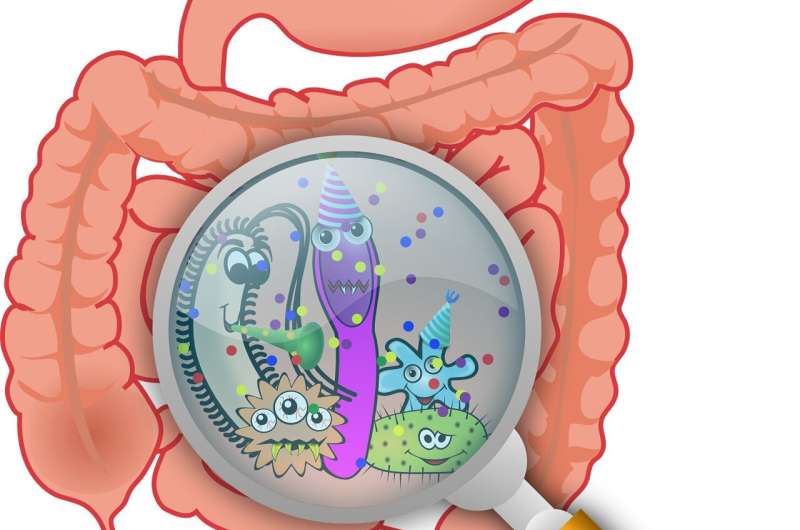This article has been reviewed according to Science X's editorial process and policies. Editors have highlighted the following attributes while ensuring the content's credibility:
fact-checked
peer-reviewed publication
trusted source
proofread
Common food preservative has unexpected effects on the gut microbiome

Food manufacturers often add preservatives to food products to keep them fresh. The purpose of these preservatives is to kill microbes that could break down and otherwise spoil the food. Common additives like sugar, salt, vinegar and alcohol have been used as preservatives for centuries, but modern-day food labels now reveal more unfamiliar ingredients such as sodium benzoate, calcium propionate, and potassium sorbate.
Bacteria produce chemicals called bacteriocins to kill microbial competitors. These chemicals can serve as natural preservatives by killing potentially dangerous pathogens in food. Lanthipeptides, a class of bacteriocins with especially potent antimicrobial properties, are widely used by the food industry and have become known as "lantibiotics" (a scientific portmanteau of lanthipeptide and antibiotics).
Despite their widespread use, however, little is known about how these lantibiotics affect the gut microbiomes of people who consume them in food. Microbes in the gut live in a delicate balance, and commensal bacteria provide important benefits to the body by breaking down nutrients, producing metabolites, and—importantly—protecting against pathogens. If too many commensals are indiscriminately killed off by antimicrobial food preservatives, opportunistic pathogenic bacteria might take their place and wreak havoc—a result no better than eating contaminated food in the first place.
Effects on good and bad bacteria
A new study published in ACS Chemical Biology by scientists from the University of Chicago found that one of the most common classes of lantibiotics has potent effects both against pathogens and against the commensal gut bacteria that keep us healthy.
Nisin is a popular lantibiotic used in everything from beer and sausage to cheese and dipping sauces. It is produced by bacteria that live in the mammary glands of cows, but microbes in the human gut produce similar lantibiotics too. Zhenrun "Jerry" Zhang, Ph.D., a postdoctoral scholar in the lab of Eric Pamer, MD, the Donald F. Steiner Professor of Medicine and Director of the Duchossois Family Institute at UChicago, wanted to study the impact of such naturally-produced lantibiotics on commensal gut bacteria.
"Nisin is, in essence, an antibiotic that has been added to our food for a long time, but how it might impact our gut microbes is not well studied," Zhang said. "Even though it might be very effective in preventing food contamination, it might also have a greater impact on our human gut microbes."
He and his colleagues mined a public database of human gut bacteria genomes and identified genes for producing six different gut-derived lantibiotics that closely resemble nisin, four of which were new. Then, in collaboration with Wilfred A. van der Donk, Ph.D., the Richard E. Heckert Endowed Chair in Chemistry at the University of Illinois Urbana-Champaign, they produced versions of these lantibiotics to test their effects on both pathogens and commensal gut bacteria. The researchers found that while the different lantibiotics had varying effects, they killed pathogens and commensal bacteria alike.
"This study is one of the first to show that gut commensals are susceptible to lantibiotics, and are sometimes more sensitive than pathogens," Zhang said. "With the levels of lantibiotics currently present in food, it's very probable that they might impact our gut health as well."
Harnessing the power of lantibiotics
Zhang and his team also studied the structure of peptides in the lantibiotics to better understand their activity, in the interest of learning how to use their antimicrobial properties for good. For example, in another study, the Pamer lab showed that a consortium of four microbes, including one that produces lantibiotics, help protect mice against antibiotic-resistant Enterococcus infections. They are also studying the prevalence of lantibiotic-resistant genes across different populations of people to better understand how such bacteria can colonize the gut under different conditions and diets.
"It seems that lantibiotics and lantibiotic-producing bacteria are not always good for health, so we are looking for ways to counter the potential bad influence while taking advantage of their more beneficial antimicrobial properties," Zhang said.
More information: Zhenrun J. Zhang et al, Activity of Gut-Derived Nisin-like Lantibiotics against Human Gut Pathogens and Commensals, ACS Chemical Biology (2024). DOI: 10.1021/acschembio.3c00577
Journal information: ACS Chemical Biology
Provided by University of Chicago





















